RUSTY TALK WITH PENN KEMP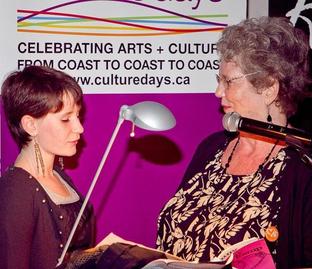 Penn Kemp Penn KempPhoto by Wendy Saby London, Ontario performance poet, activist and playwright Penn Kemp is the 40th Life Member of the League of Canadian Poets. This year she received the Queen Elizabeth 11 Diamond Jubilee medal for service to the arts. Penn has published twenty-five books of poetry and drama, had six plays and ten CDs produced as well as Canada’s first poetry CD-ROM and several award-winning videopoems. As the inaugural Poet Laureate for the City of London, she initiated and judged Poetry in Motion and the National Haiku Competition. As Canada Council Writer-in-Residence for University of Western Ontario for 2009-10, her project was the DVD, Luminous Entrance: a Sound Opera for Climate Change, Pendas Productions. Kathryn Mockler: What is your first memory of writing creatively? Penn Kemp: I remember my own early discovery of and delight in language. As a child, I did not coddle my dolls. I sat them up and read the poems, stories and nursery rhymes my mother had read to me. The words she read would sink into the well of my hearing and become part of me; their rhythms would dance inside my body like northern lights. I ate up those words with a necessity as strong as hunger. Even at first hearing, the words were somehow familiar as if I recognized in them old friends. I remember swelling proudly with the power of words, in learning first to read and then actually to write, to put down the letters so that they made sense to anyone who could read. I wrote my first poem when I was six, excited and amazed at having created through apparent magic something out of nothing with marks on a page accompanied by a drawing of kids skating. I glimpsed a world in which words had a life of their own, just as toys did. I knew that if I could wake at the right time at night I would catch my toys at play. So too, I felt words could be surprised and brought to life on the page. Writing that first poem was the first time that I recall consciously feeling that I was doing an adult thing creating something entirely on my own, assuming independence growing up! I felt like the Little Red Hen in the nursery story: "‘I can do it myself,’ said The Little Red Hen, and she did." KM: What keeps you going as a poet or why do you write? PK: When I write, I begin an adventure equipped with my writing tools and everything else I know about myself and the world. By the end of the day, everything I knew and thought may be transformed or discarded. It intrigues me that what I know and start off with is the very means for realizing what is unknown. I write to articulate the moment, to puzzle out feelings or incidents I can't figure out. The best poems come, though, when I follow the language of a striking phrase. Sound leads me. KM: Could you describe your writing process? (For example, do you write every day? When? Where? How do you approach revision, etc.) PK: I write every day, in the morning, in the little room that was my childhood bedroom. It looks out on a small greenhouse, a source of inspiration and delight all year. The green throughout the winter keeps me from getting restless and hungry for sun. Often in the morning as I transcribe dreams, they become poems. They're not usually very good poems so they don't see the light of day beyond a file in my computer, but they keep the energy of poetry flowing. The problem I have with them is that they are too narrative and I feel I need to stick to the literal story line that the dream gave me. I revise constantly, even when I am performing, pencil often in hand. Reading the poem in front of an audience allows me to really hear what works...and what does not. My first book, Bearing Down, was performed in four voices for a Seattle FM radio show in 1973. That performance opened up the door to possibilities for the spoken word in those early days. I've been lifting the word off the page any way I could since then, most recently in videopoems. But the ear remains my first love. Concentrating on the voice rather than gesture or physical presence in communicating poetry has taught me to listen acutely, and that's had an effect not just on my sound poetry but on all my work. Collaborating with artists of different disciplines is exciting and energizing. And with the Cloud, friends and fans can hear the work in Brazil, in India, in Britain simultaneously!” KM; What writers were influential to you when you first started out? And what poets are you reading now? PK: Victor Coleman, the editor at Coach House Press and a neighbour on Toronto Island, was influential and encouraging in introducing me to the poetic community across North America. My first book, Bearing Down, came out from Coach House, 1972. I organized a poetry reading series at A SPACE in Toronto for several years in the early Seventies. I invited poets I admired, like P. K. Page, Phyllis Webb, Daphne Marlatt, all of whom became friends and correspondents. In those days, the Canada Council sponsored American poets so I invited heroes like Diane di Prima, Allan Ginsberg, Robert Creeley and Edward Dorn, all very influential. I read avidly and widely as poetry continues to inspire new poems. These days I edit quite a few manuscripts for poets, and I read poets coming to London as well as books for my literary radio show, Gathering Voices. And new books coming out: I particularly like Brick Books. KM: Your funniest literary moment, if you have one. PK: The funniest literary moment happened this year on January 11 at 8.30am. As Poet Laureate for the City of London, I was formally addressing 1200 folks at the Mayor's STATE OF THE CITY ADDRESS” at the London Convention Centre. The topic was “Believe…”. Well, I couldn't believe the three very audible interruptions! They turned out to be the complaints of a Russian robot. It was squawking in Russian that its battery was wound down. I kept on talking: you can see the situation on livestream. KM: What are you working on now? PK: I wish I could say that I'm finishing a manuscript and I am, slowly, but the times demand I continue as an activist in protesting federal budget cuts. So I'm organizing a reading Saturday, September 29, 2012, 2-4 pm. "100,000 Poets for Change" Reading for Culture Day. Landon Public Library (downstairs), 167 Wortley Rd., London, ON. Our free afternoon reading will be part of an international event which will take place in many cities, in many villages and in the countryside all over the world, at the same time and date. The first order of change is for poets to get together to perform, educate and entertain, simultaneously with others around the world, changing how we see our own community and the global community. The host in Toronto who asked me to organize a London reading may be doing some Skype connections with us and other cities, other provinces. Such an event ties in nicely with our national Culture Days happening at the same time. There will be a blog for us on 100,000 Poets for Change. Twenty-three poets are signed up, including Susan McMaster, President of The League of Canadian Poets. Musicians Jennifer White and Robert McMaster as well! Good will? Immeasurable! And I am writing a book on Jack Layton's support of and interest in the arts in Canada. I'm now collecting anecdotes, reminiscences and opinions or observations about Jack and the arts Jack in the arts (that guitar, that piano, that revised song!) the role of the arts for him. As Jack would remind me, he was a proud member of the Writers’ Union! I've just collated all his emails to us and they include some interesting discussions. They're bitter-sweetly sad to read now, given all we have lost in Jack...but of course we continue in hope. I’ll also be interviewing folks for my radio show, Gathering Voices. Olivia Chow endorses the work: "I heartily encourage folks to send Penn your stories of Jack’s relationship with and his support of the arts. This project is a great opportunity to share our stories about how Jack and the NDP celebrated our Canadian cultures and what we must do together to continue this relationship. You know he loved to make music and we loved to dance!" When Jack Layton died last August, he was given a state funeral. Roy Thompson Hall was packed; the lineup of artists celebrating Jack stellar and the street theatre outside was sublime. I would like to commemorate Jack’s birthday in July and the first anniversary of his death with two e-shorts on Amazon.ca. I believe such pieces would be timely and widely read, given the nation’s outpouring of love and sympathy. Jack Layton's support of and interest in the arts in Canada underlay his politics. In his long municipal and federal political life, he always included and encouraged artists to become activists. My working title is Jack Layton: Art for Action! On Saturday, August 4, I'm participating in The Summer Soirée Festival of the Arts, Aeolian Performance Hall, London, Ontario. Afternoon workshop Gary Diggins, Jocelyn Drainie and me on The Healing Nature of Sound and then an evening performance, Sonica Hypnotica. Chris Meloche and I will kick off the evening event with new work in progress from The Electric Folklore Machine. 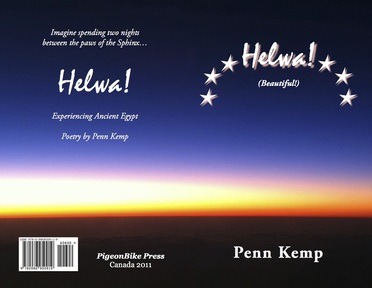 PENN KEMP'S MOST RECENT BOOK Helwa!, PigeonBike Press, 2011 Description PigeonBike Press has launched Penn Kemp's chapbook of Helwa! alongside the release by Pendas Production of Penn Kemp's CD, Night Vision, which includes Helwa!. Since her first book was published by Coach House Press in 1972, she has been pushing textual and aural boundaries, often in participatory performance work. Many of her recent CDs are what Penn terms "Sound Operas": poetic narratives that weave sound, imagery and music in the counterpoint of many voices. Working across a variety of cultural practices to engage her audience, she hosts an eclectic literary show, Gathering Voices, archived on CHRW. Having performed in festivals around the world, most recently in Britain, Brazil and India, Penn lives in London Canada, where she edits poetry for Pendas Productions, a small poetry publisher she and husband Gavin Stairs run. Penn has been heralded by the Writers’ Union as a “one woman literary industry”. BETWEEN BETWEEN Between Between is a short film that concerns the process of mourning, translating some of Penn Kemp's performance poetry into visual imagery for a compelling, evocative portrayal of that state. Between Between examines the experience both of the mourner and (perhaps) of the newly dead. A Penn Kemp and Dennis Siren collaboration.
Kathryn Mockler is the publisher of The Rusty Toque. 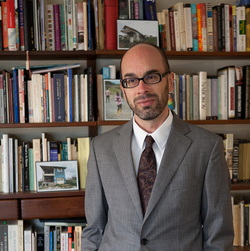 Michael Robbins Michael RobbinsPhoto by Robert Baird Michael Robbins was born in Topeka, Kansas. His poems and criticism have appeared in The New Yorker, Poetry, Harpers, London Review of Books, Village Voice, The New York Observer, and several other journals. He received his PhD in English from the University of Chicago. Kathryn Mockler: Why did you become a poet? Michael Robbins: To impress a girl named Sarah Chesnutt. KM: Could you describe your writing process? (Do you write every day? When? Where? How do you approach revision, etc.) MR: I don't write every day. My writing process is erratic. Sometimes I'll write three poems in a week, sometimes I'll write none for a month. After I've written a draft of a poem, I send it to my friends Anthony Madrid and Tricia Lockwood, who happen to be two of the best poets now writing, and wait for their input. Anthony's responses employ a byzantine system of check-marks and insults. Tricia just tells me if she thinks it's good, what works for her and what doesn't. I don't know how people write poems without Anthony and Tricia to provide feedback. KM: What is the best piece of writing advice you've heard or been given that you actually use? MR: Well, with my students I constantly repeat Ezra Pound's "Go in fear of abstractions." I write it on the board like fifty times a semester. But the only real advice anyone needs, because it contains all possible advice, is: go to the library and read every goddamned book in it. KM: What's the best thing about being a writer and what's the worst thing? MR: Who knows. "Being a writer," that's not even a thing. KM: What have you read recently that excites you? MR: Poetrywise, Mary Ruefle and Louise Glück are just as good as poets get these days. Glück kills me, she just up and kills me dead, for no good reason, I hate her. D. A. Powell. Toujours Seidel. And lots of essayists: John McPhee, John Jeremiah Sullivan, Annie Dillard, Marilynne Robinson. I just got the Norton critical edition of the English Bible, it's fucking amazing. You wanna be a poet and you're not reading the King James Bible, you're kidding yourself, just go home. KM: Your funniest or favourite literary moment, if you have one. MR: I can't begin to imagine what this question means. KM: What are you working on now? MR: My second book. It's called The Second Sex. I've just started it, written about ten poems, but I have it in my head, I know what I want to do. 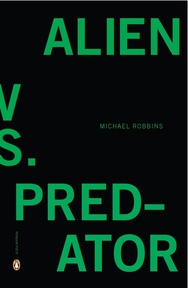 MICHAEL ROBBINS' FIRST BOOK OF POETRY Alien vs. Predator, Penguin Books, 2012 The debut collection of a poet whose savage, hilarious work has already received extraordinary notice. Description from Penguin Books Since his poems first began to appear in the pages of The New Yorker and Poetry, there has been a lot of excited talk about the fresh and inventive work of Michael Robbins. Equal parts hip- hop, John Berryman, and capitalism seeking death and not finding it, Robbins's poems are strange, wonderful, wild, and completely unlike anything else being written today. As allusive as the Cantos, as aggressive as a circular saw, this debut collection will offend none but the virtuous, and is certain to receive an enormous amount of attention. Check out some of Michael Robbins' poems in the following journals: Boston Review The Awl La Petite Zine HTMLGIANT nonsite Poetry 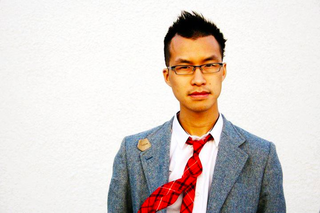 Ray Hsu Photo by Clare Yow Dr. Ray Hsu is co-founder of the Art Song Lab, an interdisciplinary platform that partners 24 writers and composers to create fusions in the genre of art song alongside performers. While completing his Ph.D. at the University of Wisconsin-Madison, he taught for two years in a US prison, where he founded the Prison Writing Workshop. The Workshop brings campus-based writers to the prison to write alongside incarcerated writers in a writers’ studio environment and mentors incarcerated writers writing towards their High-School Equivalency Diplomas. Dr. Hsu is the author of two award-winning books and writing in over fifty publications internationally. His work has been set to music and adapted for film. In addition to teaching and consulting, he has been interviewed for television, radio, and print media as UBC Expert in youth trends, popular culture, and diversity. RUSTY TALK WITH RAY HSU Kathryn Mockler: What is your first memory of being creative or writing creatively? Ray Hsu: In grade 2 we had to make a book. I wrapped corrugated cardboard in felt for the covers. For the plot I ripped off the storyline for Omega Race: KM: Why did you become a poet? RH: They seemed to be having so much more fun than novelists, or at least I thought so as an undergrad. KM: Could you describe your writing process? RH: I barely write at all. Or the poems write themselves, if by poems you mean taking screen capture videos of me playing Diablo 3 in which I play a barbarian named "Poem." KM: Do you have any advice on how to help new writers prepare to read or perform their work to an audience and/or to best engage an audience? RH: The best thing to do is to not look over everyone's heads. Folks who do that prolly heard once that they should make "eye contact," so instead they look over everyone's heads. It's even more distracting than burying one's face in the page. Once a friend kept looking over everyone's head while I was in the audience. My friends and students were trying to nudge me awake as subtly as they could. I call this piece, "The Critic." KM: What writers or poets would you recommended to an aspiring writers? Or what writers were influential to you when you first started out? RH: Anne Carson. Carleton Wilson. Al Moritz. Michael Ondaatje. Carleton Wilson. KM: Could you discuss your interest in activism, collaboration, and experimentation and how these have influenced your artistic practise? RH: A former member of the Weather Underground once said that the difference between being an activist and being an organizer is that organizing involves a whole lot of people whereas activism does not necessarily involve a lot of people. Collaboration, which involves at least one other person, is appealing because I bore myself. I like to organize with my audiences. Or call them participants. KM: Your funniest literary moment. RH: This: ...may be funny in a different way from this: KM: What are you working on now? RH: Laying siege to the idea of "Asian Canadian culture" through this here print magazine: 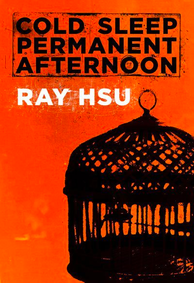 RAY HSU'S MOST RECENT BOOK Cold Sleep Permanent Afternoon, Harbour Publishing, 2010 Description from the publisher Cold Sleep Permanent Afternoon, the follow-up to Ray Hsu’s award-winning first collection, Anthropy, is the second book in a prospective trilogy that explores the “grammar of personhood.”  Michael V. Smith Michael V. SmithPhoto by David Ellingsen Michael V. Smith is a writer, comedian, filmmaker, performance artist and occasional clown teaching creative writing in the interdisciplinary program of the Faculty of Creative and Critical Studies at UBC's Okanagan campus in BC's Interior. He is the author of the novels Progress (Cormorant Books 2011) and Cumberland (Cormorant Books, 2002) which was nominated for the Amazon/Books in Canada First Novel Award. In recent years, Smith won Vancouver's Community Hero of the Year Award and the inaugural Dayne Ogilvie Award for Emerging Gay Writers. He's also won a Western Magazine Award for Fiction, scooped two short film prize categories at Toronto's Inside Out festival, and was nominated for the Journey Prize. His videos have played around the world, in cities such as Milan, Dublin, Turin, London, New York, Toronto, Paris, Geneva, Berlin, Glasgow, Lisbon, Beirut, Amsterdam, Copenhagen, Buenos Aires, SF, LA and Bombay. Smith is an MFA grad from UBC’s Creative Writing program. Vancouver Magazine has considered him one of its city's 25 most influential gay citizens whereas Loop Magazine named him one of Vancouver’s Most Dangerous People... His first book of poetry is What You Can’t Have (Signature Editions, 2006), short-listed for the ReLit Prize. In 2008, he published a hybrid book of concrete poems/photographs, Body of Text (BookThug), created with David Ellingsen. RUSTY TALK WITH MICHAEL V. SMITH Kathryn Mockler: What keeps you going as a writer? Michael V. Smith: I’ve always loved a puzzle. My novels have felt like long complicated puzzles that I tried to figure out. Really, every book is a mystery novel, right? You read to the end to find out the whodunnit, in whatever shape that takes. How is this book going to end? Even, how is the poem going to end? How does it work? So writing is the best way to enjoy making puzzles (long ones like novels, short ones like a poem) and still get paid. Okay, I use teaching to get paid. What keeps me going is a fine alchemy of things. There are many pleasures in creating: simple ego-stroking, the thrill of feeling like I’m discovering something, a satisfaction in accomplishment, being generous with myself, the feeling that I’m creating a conversation with someone about a collection of ideas (or characters) I’m very fond of, and the pleasure that comes from being engaged with the world. I’ve never thought of writing as a solitary act. I don’t know where that idea comes from. Writing is a very long one-sided conversation, but I’m always aware that eventually an audience will hear it, and listen, and join in. Kathryn Mockler: What is the revision process like for you? Michael V. Smith: With novels, after I have a first draft, I take out all the parts of the flab that aren’t plot. Just cut it all away. If there are bits of information I particularly like, or can’t do without, then I find somewhere to slip that back in. Usually, that first draft, cleaned up, is a solid skeleton. Then I do drafts that look at fixing specific things: I go through the whole manuscript, for example, and look at tying the events more closely together, so that one event is the cause of what comes next, or I do an edit to ‘psychologize’ the characters, meaning I add in some of the unwritten emotional life of the character, or flush out a bit of background, to fill out our sense of character. It’s a great way to edit for me, because it gives me focus on a particular skill. I always do other work at the same time, of course. One type of change triggers five others. But if I’m just approaching the novel as a whole, it’s overwhelming, and hard to see it clearly, so I love going in there with a tool in hand and digging around, which makes the whole process more manageable. Kathryn Mockler: How did you deal with rejection when you first started out? Michael V. Smith: Rejection is all part of the business, so if you aren’t rejected, you aren’t in the business. I take rejections as a good sign—I’m being a writer. Kathryn Mockler: What are you working on now? Michael V. Smith: I'm working on two projects: a series of tribute videos to friends and family who are ill, and a collection of essays titled Men. 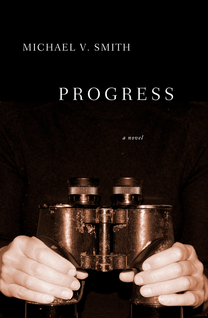 MICHAEL V. SMITH'S MOST RECENT NOVEL Progress, Cormorant Books, 2011 Description Since her fiancé’s death at eighteen, Helen Massey has spent her life avoiding it. Change comes when her town is only months away from being thirty feet under water. A government agency, The Power Authority, is relocating the entirety of her hometown to make way for a power dam project. What can’t be moved will be torn down. Even the cemetery is to be dug up and reinterred nearby. While visiting her lover’s grave, Helen witnesses a man fall to his death on the power dam worksite. “He fell like a sack, straight down, with one arm waving in circles. He fell past the other workman strapped into a harness who must have been surprised to see him pass. Mocking the air. It seemed he fell without a sound.” That same day, her brother returns unannounced after a fifteen-year absence. Robert Massey was a runaway. The construction made his homecoming a “now or never” decision, he tells his sister. “I didn’t want to have to come back in a boat to see the family home.” When Robert discovers his parents kept the reasons for his departure a secret—too little has changed—he confesses, hoping his sister might bury the past. So begins their transformations. The siblings must negotiate their shared history, and their differences, if they are to find themselves a future. In his essay, "A Memoir of Progress," Matthew Rader offers a brief memoir about his experiences with Michael V. Smith's latest novel Progress. This essay is published by AngelHousePress. Read an excerpt of Cumberland. For more information about Michael V. Smith go to his website. |
Rusty Talk
Rusty Talk Editor: Archives
November 2017
Categories
All
|

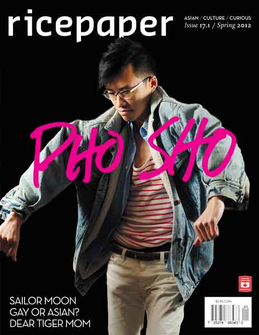
 RSS Feed
RSS Feed
